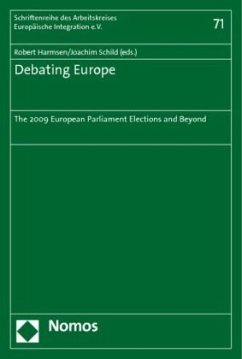The book offers a selection of thirteen country studies on the European Parliament election campaigns and the recent developments of national debates surrounding European integration, further allowing for a comparative reflection on the more general evolution and limits of discourses concerning the European integration project. Comparisons are drawn across four principal axes of discourses: the political project of European integration, the social and economic project of European integration, the preservation of national identity, and the differences in prevailing national 'pro-integrationist' discourses. This thematic cataloguing facilitates a 'mapping' exercise - looking for distinctive patterns of the framing of European issues which are shared by definable subsets of member states. The editors identify overall trends across countries such as the toning down of federalist discourses in the founding member states. The individual chapters confirm the scholarly interest of studying 'national European debates' with their 'sticky' representations of both a nation's place in the European integration project and the corresponding place of that project in constructions of national identity and polity. These representations appear open to evolution, an evolution which is generally in a 'critical' direction.Contributors:Rebecca Adler-Nissen, Daunis Auers, Marco Brunazzo, Amandine Crespy, Ramona Coman, Oliver Daddow, Vincent Della Sala, Robert Harmsen, Karen Henderson, José Magone, Laure Neumayer, Tapio Raunio, Olivier Rozenberg, Siegfried Schieder, Joachim Schild, Cristina Stãnculescu, Hans Vollaard.
Bitte wählen Sie Ihr Anliegen aus.
Rechnungen
Retourenschein anfordern
Bestellstatus
Storno

